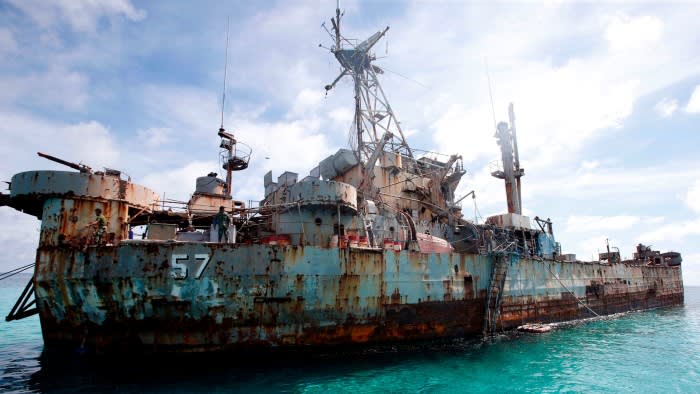President Joe Biden Warns China Over Aggressive Activity in South China Sea
President Joe Biden will express serious concerns to China regarding its increasingly aggressive activity in the South China Sea. During summits with Japanese Prime Minister Fumio Kishida and Philippines President Ferdinand Marcos Jr., Biden aims to address the escalating tensions in the region.
Concerns Raised over Second Thomas Shoal
Senior US officials have stated that President Biden will particularly emphasize concerns over the situation surrounding the Second Thomas Shoal. This submerged reef in the Spratly Islands has seen the Chinese coast guard use water cannons to prevent the resupplying of Philippines marines stationed on the Sierra Madre, an aging ship that has been lodged on the reef for the past 25 years.
The officials assert that the US-Philippines Mutual Defense Treaty, which applies to the Sierra Madre, will be highlighted by President Biden. They further reveal that concerns over this matter were conveyed during Biden’s recent conversation with Chinese President Xi Jinping, expressing “deep concern.”
One official, speaking to the Financial Times, warned that China is underestimating the potential for escalation. They conveyed that the mutual defense treaty covers not only the Philippine sailors and ships but also extends to include the Sierra Madre. The US has been trying to make this clear through a series of conversations, emphasizing the potential consequences that China might face if it continues its aggressive tactics.
Admiral John Aquilino, head of US Indo-Pacific command, has previously issued similar warnings to both a delegation of retired Chinese military officers and Cui Tiankai, China’s former ambassador to the US. However, Indo-Pacom has not provided any statement on this.
US Cautious of Setting a “Red Line”
The US government is approaching the situation cautiously, refraining from establishing a definitive “red line” with Beijing. Officials fear that the Chinese may deliberately approach the boundary of such a line, avoiding a direct violation while still engaging in provocative actions. Nevertheless, US officials underscore that China must reconsider its ongoing tactics, as failure to do so could result in severe consequences.
According to a second official, China may perceive its actions as falling below the threshold set by the US commitments under the mutual defense treaty. However, the US government cautions against disregarding the way China’s rules of engagement and responsibility might evolve. The second official acknowledges that their rules and control over their own actions may not be fully established, highlighting the complexity of the situation.
Risk of Direct US-China Military Confrontation
China expert Bonnie Glaser, affiliated with the German Marshall Fund, identifies the Second Thomas Shoal as the greatest risk area for a direct military confrontation between the US and China in the present time. Glaser warns that if Beijing directly attacks Philippine ships or armed forces, the US would be compelled to respond. Such a scenario could lead to a major political crisis between the two nations and, at worst, a broader military conflict.
The Philippine ambassador to the US, Jose Manuel Romualdez, insists that both nations have a hope to not invoke the mutual defense treaty. However, he firmly emphasizes that if warranted, “we will not hesitate” in doing so.
Background: Second Thomas Shoal and China’s Actions
The Second Thomas Shoal is just one of several contested features in the Spratly Islands located in the South China Sea. The Philippines intentionally grounded the Sierra Madre, a second World War-era ship, on the reef in 1999 to reinforce its territorial claims in the region. The ship has served as a station for marines, necessitating regular resupply missions.
China accuses the Philippines of using the shoal to bring construction materials for reinforcing the decaying ship, which it claims poses a risk of disintegration. Beijing also alleges that the Philippines has reneged on a promise to remove the stranded ship – a claim that the Filipino government denies.
According to Dennis Wilder, a former top CIA China analyst, Beijing aims to test the response of the US government if China tries to remove the Philippine marines from the Sierra Madre and destroy the vessel. Wilder believes that China, in line with its actions elsewhere in the South China Sea, intends to establish a military outpost on the reef. This outpost would secure China’s claim in the area and potentially serve as a forward operating location for its combat operations against US forces.
Nevertheless, there are experts, including Jeff Smith from the Heritage Foundation, who advocate for a tougher stance from the US government. Smith urges the US to participate in joint resupply missions with Filipino forces and explore options to replace the deteriorating Filipino ship. He draws attention to the mistakes made in 2012 when China’s military coercion resulted in the seizing of Scarborough Shoal from the Philippines, setting a detrimental precedent.
